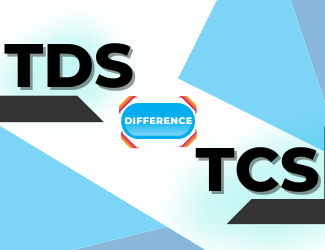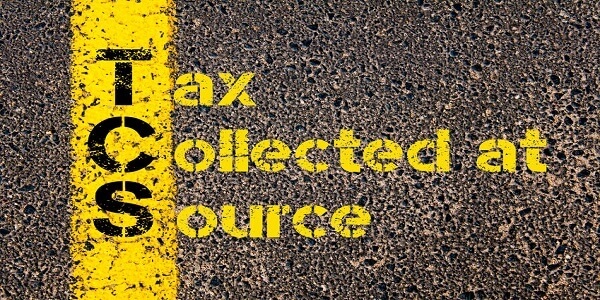Difference between TDS and TCSIntroductonTax Deducted at Source (TDS), and Tax Collected at Source (TCS) are two of the essential concepts in India's taxation system, which apply to almost all types of transactions. Both terms are related to the Indian Income Tax Act and are used for collecting taxes from individuals and organizations. The Income Tax Department uses both TDS and TCS to collect taxes directly from the source instead of filing a tax return. 
TDS is a mechanism by which the Government collects tax from the source itself without waiting for the actual payment of taxes by the taxpayer. TCS is a mechanism by which the Government collects tax from the buyer when purchasing goods or services. TDS is deducted from the payment made to an individual or company, and TCS is collected from the buyer at the time of purchase of goods or services. TDS is a way of collecting taxes by deducting a certain percentage from the source payment itself. It applies to salary, commission, professional fees, interest, rent, etc., and is paid to the Government by the deduction. While, TCS is a way of collecting taxes at the time of sale of goods at the rate prescribed by the Government. It is managed by the seller from the buyer of goods and is paid to the Government. Now lets discuss the terms in details, What is TDS?Tax Deducted at Source (TDS) is a deduction made by the payer of the income from the payee's income, and the amount so deducted is deposited with the Government. TDS applies to income earned from various sources like salary, commission, rent, etc. TDS applies to income an individual or organization makes, which is then deposited with the Government. The amount of TDS is calculated as a percentage of the total revenue earned and is deducted from the total income. 
The payer of the income is responsible for deducting the TDS from the payment made to the payee and then depositing it with the Government. The payer is also responsible for filing the TDS returns and submitting the same to the Government. The payee must also submit the TDS certificate to the Government as proof of tax deduction. Tax Deduction at Source (TDS) is a system of collecting tax from the source itself and is directly deducted from the payment made to an individual or company. It is a form of advance tax payment credited to the government account. TDS is removed from the charges made to individuals or companies, such as salary, professional fees, interest, commission, brokerage, rent, etc. The amount of TDS to be deducted is decided by the Government according to the income tax slab of the individual or company. It is the responsibility of the payer to deduct the TDS and deposit it to the Government. Tax Deducted at Source (TDS) is a mechanism of collecting tax from a taxpayer by deducting a certain percentage of the total amount due from their income. TDS is applicable to all individuals who earn an income from any source. The payer is responsible for deducting TDS from the taxpayer's income before making the payment. TDS is removed at the rate prescribed in the Income Tax Act 1961 and is deposited with the Government within the specified time limit. Understand the above discussed point in short:
What is TCS?Tax Collected at Source (TCS) is a form of direct tax collection wherein the seller collects a certain amount of tax from the buyer when a specified product or service is sold. TCS applies to the sale of certain specified goods and services and the sales value of the product or service. The amount of TCS is calculated as a percentage of the sale value and is collected from the buyer at the time of sale. 
The seller is responsible for collecting the TCS from the buyer and depositing it with the Government. The seller is also responsible for filing the TCS returns and submitting the same to the Government. The buyer must also submit the TCS certificate to the Government as proof of tax collection. Tax Collection at Source (TCS) is a tax collection system for buyers when purchasing goods or services. TCS applies to certain goods or services, such as luxury goods, entry tickets, etc. The amount of TCS to be collected is decided by the Government according to the income tax slab of the buyer. The seller is responsible for managing the TCS and depositing it to the Government. Tax Collected at Source (TCS) is a mechanism of collecting tax from a taxpayer by collecting a certain percentage of the total amount due from the sale proceeds of certain specified goods or services. TCS applies to all persons who sell certain specified goods and services. It is the responsibility of the buyer to pay TCS to the Government at the rate prescribed in the Income Tax Act 1961 and deposited with the Government within the specified time limit. Understand the above discussed point in short:
Differences between TDS and TCSThe significant differences between TDS and TCS are as follows:
Difference Table
ConclusionTDS and TCS are two essential concepts in India's taxation system. The Income Tax Department uses both TDS and TCS to collect taxes directly from the source instead of filing a tax return. There are significant differences between TDS and TCS, including the type of tax, the amount of tax, who is responsible for deducting/collecting the tax, and the documents required for submission to the Government. TDS is a mechanism by which the Government collects tax from the source itself without waiting for the actual payment of taxes by the taxpayer. TCS is a mechanism by which the Government collects tax from the buyer when purchasing goods or services. The significant difference between TDS and TCS is that TDS is deducted from the payments made to an individual or company. In contrast, TCS is collected from the buyer at the time of purchase of goods or services. TDS applies to all individuals who earn an income from any source, while TCS applies to all persons who sell certain specified goods and services. The rate of TDS and TCS is prescribed in the Income Tax Act 1961. The payer is responsible for deducting TDS from the taxpayer's income, while the buyer is responsible for paying TCS to the Government. TDS and TCS are deposited with the Government within the prescribed time limit.
Next TopicDifference between
|
 For Videos Join Our Youtube Channel: Join Now
For Videos Join Our Youtube Channel: Join Now
Feedback
- Send your Feedback to [email protected]
Help Others, Please Share










